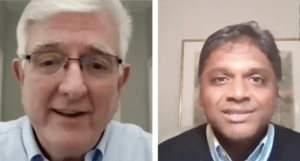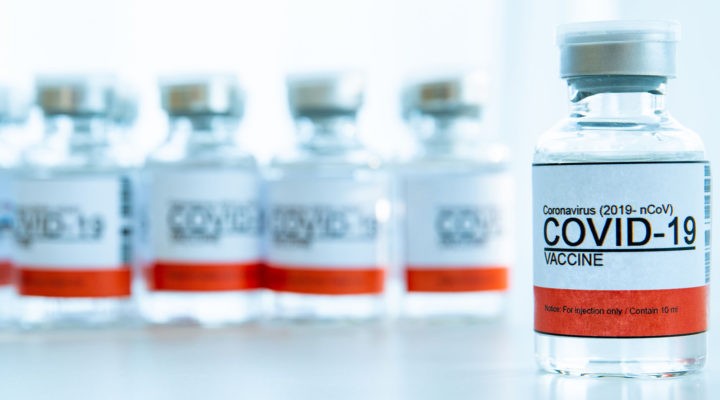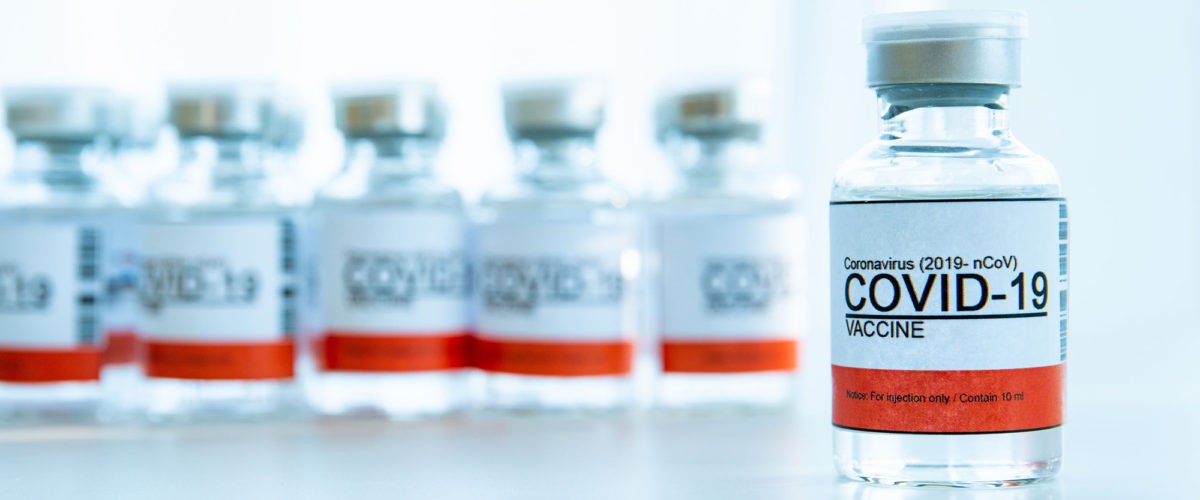Virginia’s coronavirus vaccine coordinator appealed to Baptist pastors to help model patience with the pace of inoculations and to help minimize skepticism around the growing scientific understanding of the virus and ways to prevent its spread.
In a 45-minute Zoom session with John Upton, executive director of the Baptist General Association of Virginia, Danny Avula also discussed why most clergy aren’t being classified as essential workers, the ways churches can best assist in the vaccination process and why experts are advising continued mask wearing for those who already have been vaccinated.

John Upton (left) and Danny Avula (right).
Upton described the masking and social distancing issues as especially important to congregations eager to gather for services in their churches.
“A lot of our folk are trying to figure out how to do in-person worship,” he said. “With that vaccine out there, how long do we continue to wear a mask and limit the amount of singing we do in church?”
Avula, also director of the Richmond City and Henrico County health departments, said researchers have yet to determine if vaccinated persons can spread the coronavirus. He estimated it will take approximately three months before there is enough evidence to know one way or the other.
Noting the skepticism about the virus on social media and elsewhere, Upton asked for assurance that vaccination is the right course. “A lot of times, because we don’t know what’s going on, we create our own understanding and reality,” he said.
Some of the doubt and the “mask or no mask” debate emanated from early 2020 when the scientific community knew relatively little about the coronavirus, Avula said. Hence the early emphasis on wiping down surfaces and groceries and the initial direction that masks were necessary only for health care workers.
But all that shifted with greater understanding of the airborne transmission of the virus, he added. “The way science works is you make observations and then you adjust your guidance and expectations based on those observations. That’s what’s been happening along the way. We’ve learned that coronavirus does not spread significantly by contact but primarily by respiratory droplets.”
“We are studying, we are learning, we are adjusting recommendations and each time we learn something new we are going to make sure people know it and adapt a new practice to keep everyone as safe as possible.”
But this is also where much of the politicization and angst over preventative measures were born, Avula said. “What seems like flip-flopping around the guidance made people think ‘conspiracy theory, this is a fake thing, it’s not real.’ What I hope people would say is we are studying, we are learning, we are adjusting recommendations and each time we learn something new we are going to make sure people know it and adapt a new practice to keep everyone as safe as possible.”
While the two vaccines currently in use have been found to be 95% effective with no severe side effects, Avula cited another kind of skepticism around mass health care initiatives, he added.
There is “a particular concern for people of color and African Americans because of our history, because of the distrust of government and public health and because of what many of them have lived through — forced sterilization and experimental surgeries and the Tuskegee episode,” he said.
Avula also updated Virginia Baptist pastors on the late-January Zoom call about another area of frustration in the state: the availability of doses, the pace of vaccinations and the perception that the state and health care facilities are sitting on large amounts of vaccine that could be administered to those in need.
“The reality is we have very little vaccine for the state coming in every week” which has contributed “to a pretty significant supply-demand gap,” he reported.
Figures showing doses in storage largely are those set aside for second shots. Eventually, the aim is to administer 50,000 shots a day, which Avula said would vaccinate most Virginians by the summer. “That’s the goal we’re after, and its very much a goal that’s in reach, but we don’t have the vaccine to do it.”
In the meantime, the state continues to work through vaccinations for the elderly, those with high-risk medical statuses and essential workers, leaving persons outside those groups with longer wait times, he added. “It does mean we are going to have to adjust our expectations a bit” until additional vaccines hit the market.
“This is going to be a time where, in the larger community, we are going to have to learn how to be family and care for each other.”
Upton said people of faith should be examples of calm and patience in the situation. “We are going to have to be patient. We are going to have to be mindful of others. This is going to be a time where, in the larger community, we are going to have to learn how to be family and care for each other, and I hope we in our churches will take the lead in modeling that.”
He also asked Avula if the state would consider classifying pastors as essential workers because they often are present at funerals and other intimate moments in people’s lives. And he asked if churches could serve as vaccination centers.
Clergy — such as chaplains — who serve in hospitals already are classified along with first responders, and therefore at the front of the line for vaccinations, Avula said. “There are unique categories of clergy that will be prioritized and others that will fall in with the general population.”
For the moment, the state is going to maintain a centralized and streamlined system for vaccination sites, he added. This is to safeguard the doses, which are often highly delicate, and the precise collection of vaccination data. As vaccines become more prevalent, Virginia churches may become eligible as vaccination sites.
“We see the faith community as an amazing partner, particularly for some of our populations that are at higher risk, the elderly. The church can be amazing partner in mobilizing that group,” Avula said. He suggested the use of church vans to shuttle seniors to vaccination sites.
“We stand ready to help in any way we can,” Upton responded.
He also asked how to respond to young adults who may feel it’s not beneficial to them to be vaccinated.
Avula said the coronavirus has been shown to spread by persons with zero or mild symptoms of COVID-19. “That connectedness should be a reminder to all of us that what we do to protect ourselves also protects others, and so the motivation to protect those who are much more vulnerable than us hopefully will be enough for all of us … to get vaccinated so that we can ultimately get that herd immunity.”
Related articles:
Public health officials find churches are ideal sites for COVID vaccine clinics
The church has a role to play in implementing COVID vaccine
Why herd immunity is worse than other potential ethical concerns about a COVID-19 vaccine
What about the science, faith and ethics of a coming coronavirus vaccine?
Your friendly neighbor epidemiologist has an important message for you


